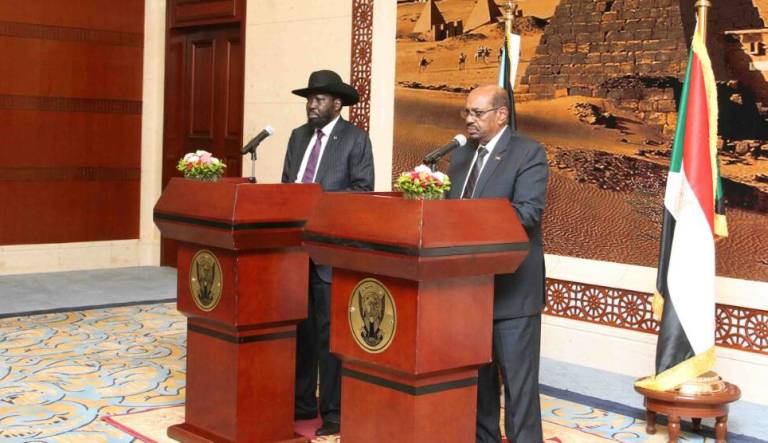South Sudan’s Kiir washes his hands of support to Sudanese rebel

November 2, 2017 (KHARTOUM) – South Sudan President Salva Kiir Mayardit Thursday reiterated that his country does not support Sudanese armed opposition groups, and announced the agreement with his Sudanese counterpart on a roadmap to implement the outstanding security agreements.
Kiir who ended a two-day visit to Khartoum pledged with his Sudanese counterpart not to allow the “saboteurs” to affect relations between the two countries.
“We do not support the Sudanese rebel movements, and if you come to Juba, you will not find them,” Kiir told a joint news conference with President Omer al-Bashir in response to accusations that his country provides support to the Sudanese rebels.
“We cannot support the opposition because the employees in the South Sudan and the army have not been paid their salaries for six months. If someone can accuse his brother, we accuse Sudan of being the source of all weapons in the South,” he further said.
He pointed out that Khartoum is also harbouring opponents of his government, stressing that he could reveal a list of their names.
They are “benefiting from the aggravation of relations between Khartoum and Juba, and are working to peddle rumours and lies to mislead the public opinion in both countries, to create political tensions and security between the two countries,” he said.
However, the President of the South Sudanese government reiterated his keenness to strengthen relations with Khartoum and remove all the obstacles obstructing the normalization process.
“We are one people in two states and we want to live in peace,” he said.
Kiir further affirmed his country’s desire to benefit from the Sudanese-Chadian experience in securing the common borders by establishing a similar joint border monitoring force to be deployed along the border between the two countries.
Kiir said he had agreed with Bashir to supervise personally the implementation of the agreements signed between Khartoum and Juba.
“I am confident that we will reap the benefits of these talks for the interest of the peoples of the two countries,” he added.
The two leader decided to proceed immediately with the activation of a safe demilitarized border zone and to combat “negative movements” along the common border.
The two countries failed in the past to operationalize the buffer zone because they didn’t yet achieve the demarcation boundary process, with the existence of many disputed areas along the over 2000km border.
One of the main reasons is the Mile 14 area, which disputed by the Malual Dinka of the State Northern Bahr el Ghazal region and the Rizeigat tribe of eastern Darfur. Immediately after the signing of the cooperation agreement, the then Governor Paul Malong Awan objected publically the deal and pledged to obstruct its implementation.
Sudanese President al-Bashi, for his part, declared his readiness to implement all the signed agreements between the two countries.
He pointed out that relations between the two countries have passed through difficult periods since the independence of the South Sudan, and said that the two countries paid dearly for those differences.
Bashir stressed that the leadership of the two countries is convinced that the best option is to cooperate and to use the border a tool for exchange of benefits and communication between the two countries.
He said that Salva Kiir’s visit to Khartoum would be a real breakthrough for the relations between Sudan and South Sudan.
“We agreed to nurture this relationship more direct communication in any hindrance to the implementation of agreements and remove obstacles to (bilateral) relations,” added the Sudanese president.
Al-Bashir revealed an agreement to open 11 crossing points between the two countries after determining the places of establishment of the competent bodies, indicating that they will be flexible and prevent “negative movements” across the border.
(ST)
